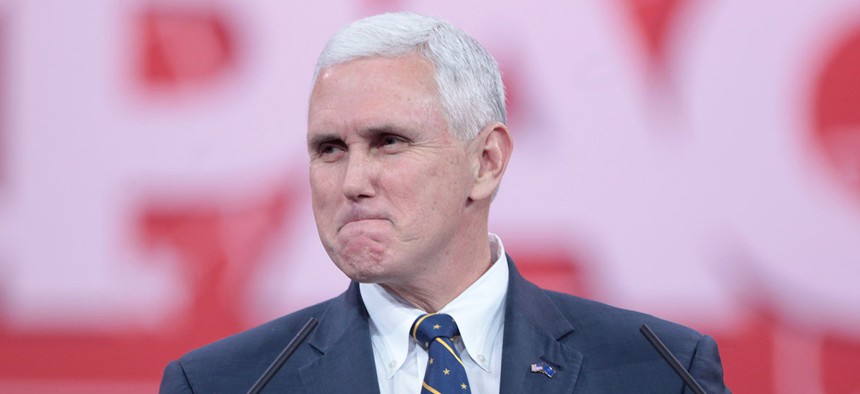
Flickr user Gage Skidmore
America's Next Chief Executive?
The Constitution assigns executive authority to the president—but a President Trump would hand it off to Mike Pence.
On Wednesday night, America will meet the man who could be the nation’s next chief executive officer—and it’s not Donald Trump.
The Constitution says that “the executive Power shall be vested in a President of the United States of America,” but Trump isn’t one to be bound by tradition. He has, instead, made it clear that he intends to hire “the best” and “the most talented” people to exercise power on his behalf. And right at the top, running the United States government, would be Trump’s pick for vice president: Indiana Governor Mike Pence.
That’s how those closest to Trump have described the role. “He needs an experienced person to do the part of the job he doesn’t want to do,” Paul Manafort told the Huffington Post’s Howard Fineman about the VP search back in May. “He seems himself more as the chairman of the board, than even the CEO, let alone the COO.”
And, The New York Times Magazine reported Wednesday, Donald Trump Jr. described the vice presidency in similar terms to a senior Kasich adviser:
Donald Jr. wanted to make him an offer nonetheless: Did he have any interest in being the most powerful vice president in history?
When Kasich’s adviser asked how this would be the case, Donald Jr. explained that his father’s vice president would be in charge of domestic and foreign policy.
It’s a long way from John Nance Garner’s memorable description of the office as “not worth a warm bucket of piss.”
So it’s striking how little focus there’s been on Pence’s record as an executive. He made his reputation in Congress as a legislator and advocate of conservative ideas, and his tenure as governor may be best known for a series of ideological clashes, including over religious freedom and gay rights. But the office for which he’s been tapped is, as Trump imagines it, an operational role, not an ideological one.
On that score, some observers give Pence strong marks. “We have a pretty effective government,” said Laura Albright, a professor of political science at the University of Indianapolis. “His administration—although it has had its own controversies policy wise—has gotten a lot done.”
The Trump campaign has been noticeably tardy in embarking on the long, arduous process of selecting and vetting prospective appointees in a Trump administration. That’s one of Pence’s strengths. “To Pence's credit, he has a good understanding of what kinds of traits and qualities are needed for the positions,” Albright said. “Relative to some other governors, he's done a really good job of finding people who fit positions.”
But not all Indianans agree. Before he abandoned his re-election bid to join Trump’s ticket, Pence faced an uncertain political future in the state. “I don't think it's any secret that this race was going to be very close and very much a referendum on Mike Pence because he just wasn't popular,” the Indiana Fiscal Policy Institute’s president John Ketzenberger told NPR.
And whatever Pence’s successes as an administrator, he’s struggled to deal with dissent. He tried setting up a state news agency in 2015, to bypass the independent press, only to abandon the half-baked proposal in the face of near-universal criticism.
Similarly, he hasn’t gotten along with independent officials. Indiana elects an unusual number of statewide officeholders—not just a governor, lieutenant governor, and attorney general, but also a secretary of state, treasurer, auditor, and superintendent of public instruction. All but that last office are occupied by Republicans. Pence, though, clashed with the Democratic schools superintendent, then tried to outflank her. He briefly established a parallel state agency she didn’t control; stripped her automatic appointment as chair of the state Board of Education; and pulled the plug on an $80 million federal grant. Given the number of federal independent agencies, many of which will retain Democratic majorities even if Trump wins, it’s a worrying precedent.
In the months between now and November, Pence’s record is likely to receive substantially more scrutiny. But for the moment, he’s being assessed mostly in terms of his electoral impact—likely negligible—and not as the man who might run the federal government for the next four years.
That’s a mistake. Trump’s advisors have made it perfectly clear that he intends to delegate day-to-day operational responsibility to his vice president. When Pence takes the stage tonight, voters should listen closely. They could well be hearing from the nation’s next chief executive.
(Image via Flickr user Gage Skidmore)






